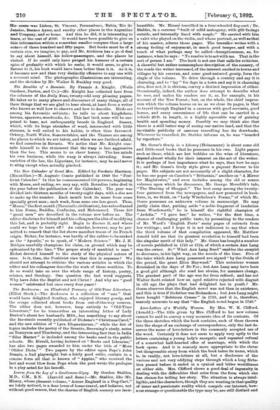'Mr. Gosse's Gossip in a Library' (Heinemann) is about some
old and little-read books that he possesses in his own. Light papers auch as, these, which are but bubbles on the •-wine of literature, depend almost wholly for their interest on theart of the writer. It is perhaps of less importance what he says, than how he says it ; and 'Mr. Gosse's lively style gives a piquant -flavour - to his :pages. His subjects are not necessarily of a slight character, for he has one paper on.Camden's " Britannia," another on "A Mirror for Magistrates," and even includes among the old or scarce volumes upon which he discourses, Mr. George Meredith's tale, "The Shaving of Shagpat." The best essay among the twenty- four garnered from the newspapers, and now presented in book- form, is, we think, on "Lady Winchelsea's Poems," of which Mr. Gosse possesses an unknown volume in .,manuscript. He may justly claim that, putting aside "a noble fragment of laudation. from -Wordsworth," . he is himself the rightful champion of " Ardelia." " I gave her;" he writes, " for the first time, a chance of challenging public taste, .by presenting to the readers of Mr. Ward's English Poets' many pages of extracts from her writings ; and I hope it is not indiscreet to say that when the third volume of that compilation appeared, Mr. Matthew- Arnold told me that its greatest revelation to himself had been the singular merit of this lady." Mr. Gosse has bought a number of novels published in 1723 or 1724, of which .a certain Ann Lang -was the owner. So " What Ann Lang Read" enables the essayist todiscourse, in his light way, on the novels of. the time. Five of the tales which.Ann Lang possessed are signed " bythe Ouida of the period, the, great Eliza Haywood." This notorious woman flourished in. the days of De Foe ; but Ann Lang may have been a good girl although she read her stories, for manners change. The greatest poet of the age was far from refined; and has not Walter Scott related how an aged relative rejected with disgust in old age .the plays that had delighted her . in youth ? Mr. Geese observes that the English novel was not then in.existence, and this is true if its father was Richardson ; but Ann. Lang might have bought " Robinson Crusoe" in 1719, and it is, therefore, scarcely accurate to.say that "the English novel began in 1740."






































 Previous page
Previous page